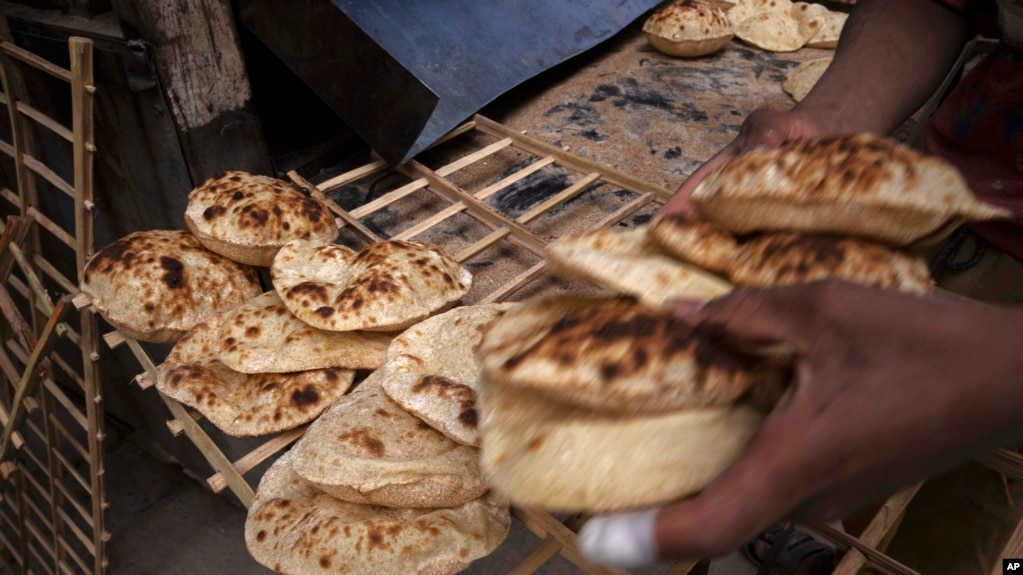Ukraine War Threatens Food Supplies in
Many Nations

International experts are warning that continued fighting in Ukraine is likely to cause major food shortages for large populations in Europe, Africa and Asia.
Russia continues to push its military campaign across Ukraine after invading the country on February 24.
Ukraine has been called the “breadbasket of the world” because it is the world’s fifth-largest wheat exporter. But Ukraine’s farming system has been disrupted as millions of people fight, flee or struggle to stay alive. Ports have been closed, preventing wheat and other important products from being exported worldwide. Wheat is widely used internationally to make into bread, noodles and animal feed.
There are also worries that Russia could have its grain exports reduced by economic restrictions placed on Russia’s government by the West. Russia is another major food provider.
While there have not yet been worldwide disruptions to wheat supplies, prices have risen 55 percent since a week before the invasion.
Arnaud Petit directs the International Grains Council. He told The Associated Press that if the war continues for an extended period, nations that depend on wheat exports from Ukraine could face shortages starting in July.
Such shortages could create food insecurity and push more people into poverty in places like Egypt and Lebanon. Many people in those countries depend on government-supported bread programs.
Egypt is the world’s largest wheat importer. Ahmed Salah, a 47-year-old father of seven in Cairo, told the AP that shortages always bring higher food prices. That, he said, could have “catastrophic” effects on the majority of Egyptians.
Anna Nagurney is an expert on supply chains and economics at the University of Massachusetts Amherst. She told the AP that wheat, corn, oils, barley and flour are extremely important to food security, especially in poorer parts of the world. With Ukrainian men being called on to fight, Nagurney asked, “Who’s going to be doing the harvesting? Who’d be doing the transportation?”
Syria, which is still involved in conflict, recently announced it would cut spending and take steps to ration some foods. In nearby Lebanon, officials are seeking to make up for a predicted wheat shortage, since Ukraine provides 60 percent of its supply.
Wandile Sihlobo is chief economist for the Agricultural Business Chamber of South Africa. He said African countries imported agricultural products worth $4 billion from Russia in 2020. He said about 90 percent of those imports were wheat.
In Nigeria, flour producers believe a shortage of wheat supplies from Russia would affect the price of bread, a common food in Africa’s most populous country.
“All of us need to look elsewhere” in the future, said Tope Ogun. He is with Honeywell Flour Mills Plc, one of Nigeria’s biggest flour processing companies. “We might not get what we need to, and there is likely going to be an increase in the price,” Ogun added.
The disruption can be felt as far away as Indonesia, where wheat is used to make noodles, bread, fried foods and snacks. Ukraine was Indonesia’s second-largest wheat supplier last year, providing 26 percent of all wheat used in the country. Rising prices for noodles would hurt lower-income people, said Kasan Muhri, who heads the trade ministry’s research efforts.
Ukraine supplies the EU with about 60 percent of its corn and nearly half of an important ingredient in the grains needed to feed cows and other animals. Russia is similarly a major supplier of fertilizer, wheat and other grains.
Words in This Story
disrupt – v. to interfere with something and stop it from continuing as it should
noodle – n. a thin often flat strip of fresh or dried dough (as of flour and egg) that is usually boiled
supply chain – n. a system of organizations or operations that work together to design, produce and deliver a product to the market
ration – v. to give people only a small amount of something because there is little of it available
snack – n. a small amount of food that is usually eaten between meals
ingredient – n. one of the things that are used to make a food, product, etc.
fertilizer – n. a natural or chemical substance you put on land in order to make plants grow well
https://learningenglish.voanews.com/a/ukraine-war-threatens-food-supplies-in-many-nations/6473898.html